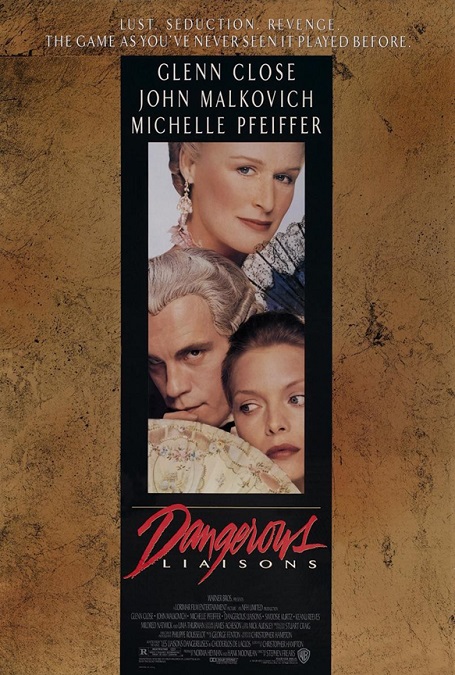
Dangerous Liaisons – 1988
This was a wonderful example of a period drama. It is a vicious story about people who use sex as manipulation in order to achieve cruel goals like revenge, personal conquests, and wanton, careless destruction, all taking place in Paris, in 1781. Glenn Close and John Malkovich are the clear villains, who, through their love of cruelty and vanity, destroy not only their own lives, but the lives of three other innocent people.
Close plays Marquise Isabelle de Merteuil, a woman who takes pleasure hurting other people and ruining their lives, yet always keeping the appearance of innocence. Her friend Vicomte de Valmont, played by Malkovich, is a vain and charming gigolo who is always looking for his next sexual conquest. The harder the challenge, the greater his pleasure.
The Marquise wants revenge against her former lover who spurned her, so she tries to hire Valmont to seduce and deflower his bride to be, Cecile de Volanges, played by a very young Uma Thurman. Valmont refuses on the grounds that Cecile is too easy a target. There is no challenge. Valmont has his sights set on a very pious, and very married, Madame Marie de Tourvel, played by Michelle Pfeiffer. After Valmont’s refusal, the Marquise strikes a bargain with him. If he is able to win his prize, and obtain written proof of his conquest, he can have one night of passion with her, a trophy he has never been able to obtain, yet has long sought.
Still wanting Cecile to be spoiled before being married, the Marquise brings in a young music teacher to do the job. A young Keanu Reeves, playing Le Chevalier Raphael Danceny, is brought in, yet he fails miserably to bed Cecile. The webs of deception and manipulation are too twisted and complex to go into, but they are many and varied, and ostensibly mean-spirited.
Suffice to say, Valmont eventually makes Madame Tourvel fall in love with him, but actually fall in love with her at the same time. But in order to win the Marquise, he spurns her. When the Marquise refuses him because he never got written proof that he bedded Madame Tourvel, he becomes incensed. Madame Tourvel dies from grief and shame, Danceny kills Valmont in a duel because of his sexual involvement with Cecile, and the Marquise’s depravities are made public, for which she is vehemently shunned by society.
The casting was all perfect with the exception of Keanu Reeves. I’m sorry, but he was never a good actor, a fact which has become painfully obvious to the world in recent years. Sure, he has had a very successful career, but only because he is smart enough to choose roles like Neo in the Matrix franchise, because he is not required to do much acting. In Dangerous Liaisons, he seemed very out of place, especially when put next to such great actors as Close, Malkovich, and Pfeiffer.
The film was nominated for 7 Academy Awards, and it won 3. For me, the most obvious win was James Acheson for Best Costume Design. The costumes were incredible, especially those worn by the Marquise. The attention to detail was obsessive and spectacular. Even the hair styles, from what I have read, were period-specific and gorgeous. The beautiful and bright brocade fabrics, the opulent adornments, and the marvelous jewelry, all made for an incredibly realistic and captivating look for the film.
And I would be remiss if I did not mention the music. The score, written by George Fenton, was heavily influenced by baroque and classical styles. Fenton wrote plenty of original music for the film, but the score also featured music composed by Vivaldi, Bach, Handel, and Gluck, though it is interesting to note that none of these composers were French. A standout piece of music was the countertenor Paulo Abel Do Nascimento’s performance of Ombra mai fu, by Handel. Just wonderful!
This was a very good movie. It was engaging, easy to follow, and yet complex, with an intensity that is inherent in the twisted plot. The characters were well-written and believable, and the verbose dialogue was spot-on. All in all a great movie. It lost the Best Picture Oscar to Rain Man, but I don’t know. It must have been a close race.








